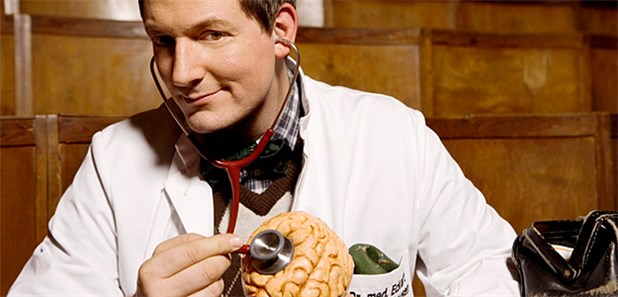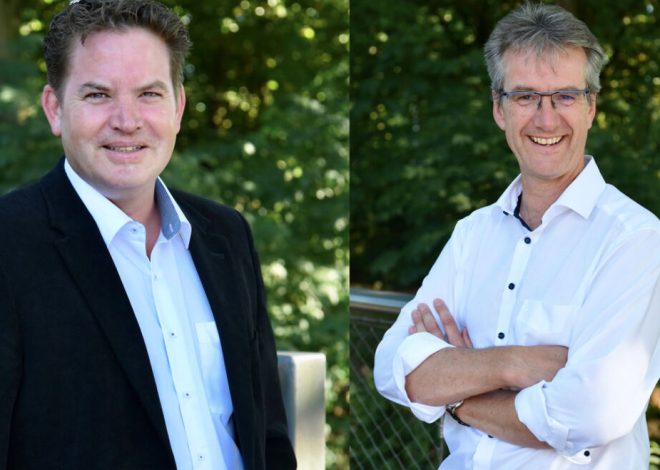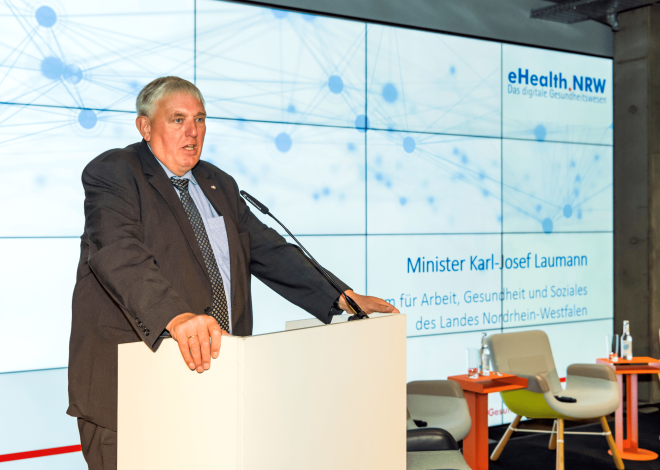
‘We are giving away our opportunities’
Doctors newspaper: Your new book “Miracles Work Miracles” is not just about medicine, but also about magic. What has magic lost in the medical world in 2016?
Dr. Eckart von Hirschhausen: More than you might think. Science has driven magic out of medicine, but not out of us humans. In my book I would like to raise awareness of the many psychological aspects of healing, with many examples from placebo effects, sham operations to vitamin tablets.
In Germany, people spend around a billion euros on nutritional supplements and vitamins that are proven to have no benefit and are often harmful. Why? This is not rational, but rather magical.
This has something to do with the sale of indulgences, which Martin Luther fought against 500 years ago. There are smokers without any urge to exercise who buy freedom from their “sins” with “smoking vitamins”.
If we in the medical profession do not understand and include these psychological mechanisms, we are largely ignoring the reality of patients.
What does reality mean to you in this context?
from Hirschhausen: Here is also an example: We have very simple means of determining whether someone has high blood pressure, and we have effective medication. But half of it ends up in the trash.
We urgently need to think about what knowledge and motivation is needed in care, so to speak, in the final stretch between prescribing and taking, so that patients actually take useful medicines.
If we want healing powers to be activated, then we have to do a better job of explaining what a drug is good for, what people can expect and what side effects are tolerable.
I find it absurd that we can produce great research, develop guidelines, do numerous effectiveness studies, but in the end we leave people to their own devices when it comes to actual care. This is a waste of billions and years of lost life.
They fill large halls on their tours, are present on television and have become real media stars. Where do you see your own role in this medical business with its growing contradictions?
from Hirschhausen: I took my first steps into the public eye in comedy many years ago and have had a long development since then. Today I am possibly Germany’s best-known doctor and see this as an opportunity and also a great responsibility, as a “court jester” and independent disseminator of healthy ideas.
I am not beholden to any official, party or boss, and I can freely say what I find important and worth knowing. This gives me the opportunity to initiate even uncomfortable discussions. For example, in the chapter “Save the healthcare system, but not this one!”
Anyone who knows my previous books will be surprised to discover many serious texts and political demands about how we should deal with the deficits in health education, the unfair distribution of life expectancy and economization.
When I was allowed to study medicine, it was a privilege for the best in a year. If you didn’t know exactly what you wanted to do, you first studied business administration. Who’s in charge at the hospital today? The business economists! Something has gone wrong in the last 20 years, right?
How is her role received by doctors?
from Hirschhausen: I have just given a keynote speech at the annual congress of the German Society for General Medicine in Frankfurt, in November I will be with the neurologists and psychiatrists, I am on the advisory board of the Cancer Aid, the Depression Foundation and in exchange with many specialist groups on health education.
We have initiated research projects with my foundation “Humor Helps Heal,” and I regularly give lectures for the next generation of doctors, even officially teaching “the language of medicine.”
A key feature of her work is humor. They make large halls laugh. How does this work?
from Hirschhausen: Basically, it’s about this: People usually know what they should actually do to feel good and stay healthy – and then they don’t do it. You can complain about it or you can laugh about it.
I firmly believe that humor is exactly the right vehicle to address these contradictions and convey insights and motivation.
Is this also a plea for more humor in the doctor’s office?
from Hirschhausen: Absolutely. But that alone is not enough. I would like to see a lot more warmth, care and empathy in everyday care. I not only claim that the patients will then feel better, but also the doctors themselves. The vast majority of doctors have stood up for these values at some point.
And we waste a good part of our opportunities if we do not use this potential for organizational, economic or training reasons. Conventional medicine has apparently alienated many people to such an extent that it is no longer perceived as a blessing but as a threat.
Patients prefer to go where there is more listening, more touching, and more promise – and then end up in the dazzling realms of alternative medicine, where everyone from serious naturopaths to esoteric commuters cavorts.
Your new book is almost 500 pages, what can you expect?
from Hirschhausen: It’s a surprise bag, and there’s something surprising to discover on every page: personal stories, photos, magic tricks and a lot to laugh about, be amazed by and try out. That’s why it’s easy to read and the initial feedback is very positive.
I’m just tired of the argument between conventional and alternative medicine, who benefits from it? There are effective and ineffective, patient-oriented and paternalistic. I give tips on how people can get through a sick healthcare system in a healthier way. And remind doctors and other health professionals to remember their roots and how the “humane” can come back into human medicine.
And the miracles aren’t neglected in the book?
from Hirschhausen: Not at all. Everyone knows unusual stories, “spontaneous remissions” or patients who survived against all expectations. I’ll tell you about three “miracles” that I experienced myself, and I’m happy when the healing powers of wonder, expectation, and wonder are honored again.
The fact that the effects of good stories, positive expectations, music, singing, dancing, touch and movement are not carefully examined and systematically used in a positive way for health is a major omission in academic medicine over the last 100 years, which has focused heavily on technology and… Receptors collapsed.
More magic and more science, that definitely goes together! We should dare, there is no contradiction.
Recipe salsa?
What else can be expected from them after this mammoth work?
from Hirschhausen: I’m not running out of topics. I was in a nursing home for three days to write the book and I find it exciting how we can develop a positive image of growing older.
This is a gift that allows us to live longer and, in the best case scenario, to remain curious, to be more relaxed and content than when we were young, and to be able to pass things on. Everyone wants anti-aging, but there will be no pill for Alzheimer’s, the brain is far too complex for that.
What has been proven to work wonders is dancing regularly, maintaining social contact and supporting others. When will there be “salsa” or “volunteering” or humor on prescription? I still want to experience that!

Ethel Purdy – Medical Blogger & Pharmacist
Bridging the world of wellness and science, Ethel Purdy is a professional voice in healthcare with a passion for sharing knowledge. At 36, she stands at the confluence of medical expertise and the written word, holding a pharmacy degree acquired under the rigorous education systems of Germany and Estonia.
Her pursuit of medicine was fueled by a desire to understand the intricacies of human health and to contribute to the community’s understanding of it. Transitioning seamlessly into the realm of blogging, Ethel has found a platform to demystify complex medical concepts for the everyday reader.
Ethel’s commitment to the world of medicine extends beyond her professional life into a personal commitment to health and wellness. Her hobbies reflect this dedication, often involving research on the latest medical advances, participating in wellness communities, and exploring the vast and varied dimensions of health.
Join Ethel as she distills her pharmaceutical knowledge into accessible wisdom, fostering an environment where science meets lifestyle and everyone is invited to learn. Whether you’re looking for insights into the latest health trends or trustworthy medical advice, Ethel’s blog is your gateway to the nexus of healthcare and daily living.

